Evaluation of Postfix Expression
Last Updated :
27 Mar, 2023
Given a postfix expression, the task is to evaluate the postfix expression.
Postfix expression: The expression of the form “a b operator” (ab+) i.e., when a pair of operands is followed by an operator.
Examples:
Input: str = “2 3 1 * + 9 -“
Output: -4
Explanation: If the expression is converted into an infix expression, it will be 2 + (3 * 1) – 9 = 5 – 9 = -4.
Input: str = “100 200 + 2 / 5 * 7 +”
Output: 757
Evaluation of Postfix Expression using Stack:
To evaluate a postfix expression we can use a stack.
Iterate the expression from left to right and keep on storing the operands into a stack. Once an operator is received, pop the two topmost elements and evaluate them and push the result in the stack again.
Illustration:
Follow the below illustration for a better understanding:
Consider the expression: exp = “2 3 1 * + 9 -“
- Scan 2, it’s a number, So push it into stack. Stack contains ‘2’.
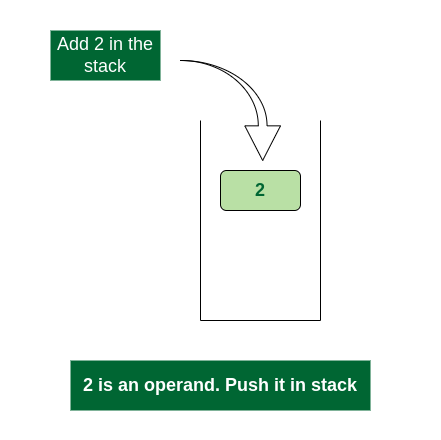
Push 2 into stack
- Scan 3, again a number, push it to stack, stack now contains ‘2 3’ (from bottom to top)
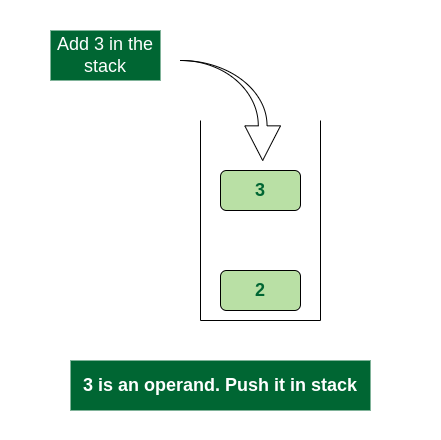
Push 3 into stack
- Scan 1, again a number, push it to stack, stack now contains ‘2 3 1’
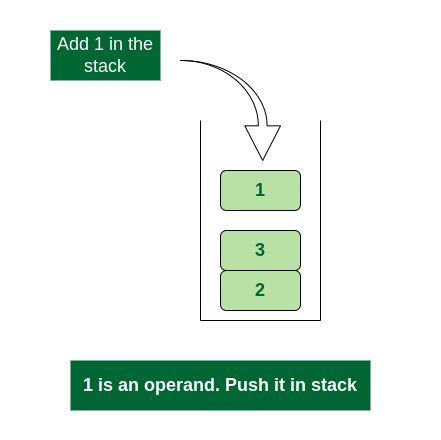
Push 1 into stack
- Scan *, it’s an operator. Pop two operands from stack, apply the * operator on operands. We get 3*1 which results in 3. We push the result 3 to stack. The stack now becomes ‘2 3’.
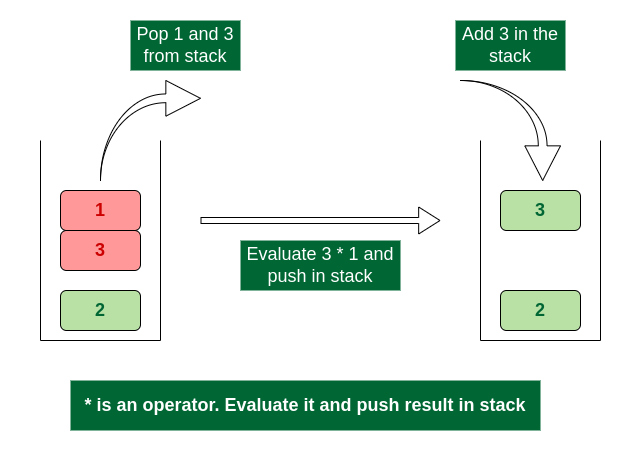
Evaluate * operator and push result in stack
- Scan +, it’s an operator. Pop two operands from stack, apply the + operator on operands. We get 3 + 2 which results in 5. We push the result 5 to stack. The stack now becomes ‘5’.
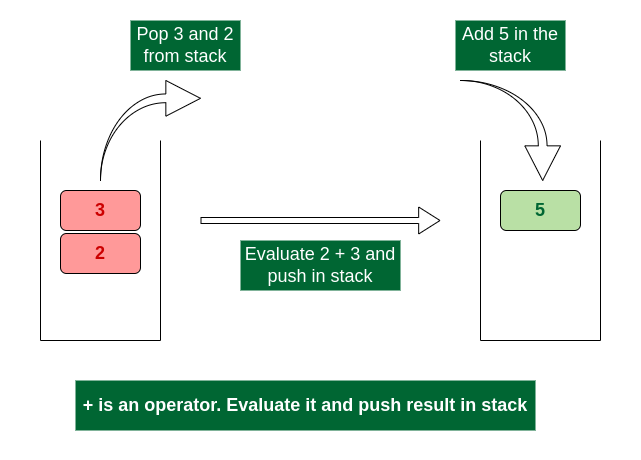
Evaluate + operator and push result in stack
- Scan 9, it’s a number. So we push it to the stack. The stack now becomes ‘5 9’.
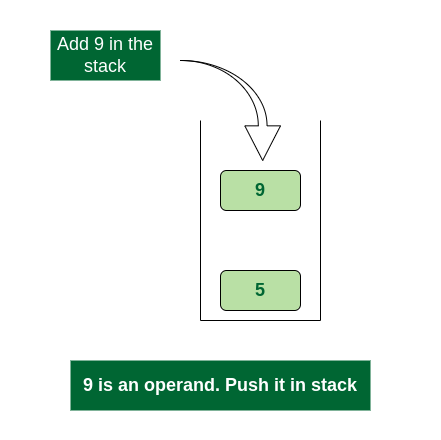
Push 9 into stack
- Scan -, it’s an operator, pop two operands from stack, apply the – operator on operands, we get 5 – 9 which results in -4. We push the result -4 to the stack. The stack now becomes ‘-4’.
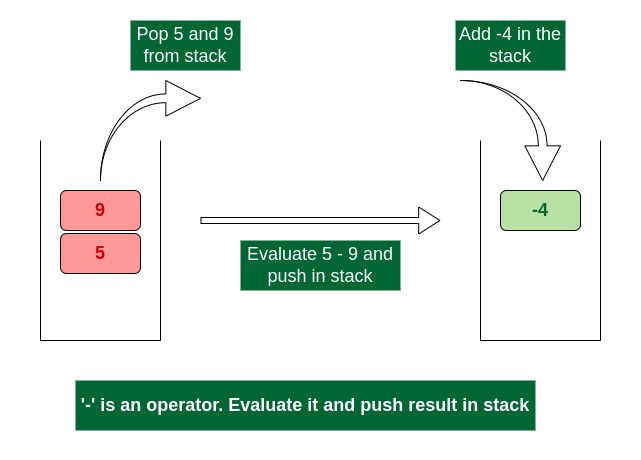
Evaluate ‘-‘ operator and push result in stack
- There are no more elements to scan, we return the top element from the stack (which is the only element left in a stack).
So the result becomes -4.
Follow the steps mentioned below to evaluate postfix expression using stack:
- Create a stack to store operands (or values).
- Scan the given expression from left to right and do the following for every scanned element.
- If the element is a number, push it into the stack.
- If the element is an operator, pop operands for the operator from the stack. Evaluate the operator and push the result back to the stack.
- When the expression is ended, the number in the stack is the final answer.
Below is the implementation of the above approach:
C
#include <ctype.h>
#include <stdio.h>
#include <stdlib.h>
#include <string.h>
struct Stack {
int top;
unsigned capacity;
int* array;
};
struct Stack* createStack(unsigned capacity)
{
struct Stack* stack
= (struct Stack*)malloc(sizeof(struct Stack));
if (!stack)
return NULL;
stack->top = -1;
stack->capacity = capacity;
stack->array
= (int*)malloc(stack->capacity * sizeof(int));
if (!stack->array)
return NULL;
return stack;
}
int isEmpty(struct Stack* stack)
{
return stack->top == -1;
}
char peek(struct Stack* stack)
{
return stack->array[stack->top];
}
char pop(struct Stack* stack)
{
if (!isEmpty(stack))
return stack->array[stack->top--];
return '$';
}
void push(struct Stack* stack, char op)
{
stack->array[++stack->top] = op;
}
int evaluatePostfix(char* exp)
{
struct Stack* stack = createStack(strlen(exp));
int i;
if (!stack)
return -1;
for (i = 0; exp[i]; ++i) {
if (isdigit(exp[i]))
push(stack, exp[i] - '0');
else {
int val1 = pop(stack);
int val2 = pop(stack);
switch (exp[i]) {
case '+':
push(stack, val2 + val1);
break;
case '-':
push(stack, val2 - val1);
break;
case '*':
push(stack, val2 * val1);
break;
case '/':
push(stack, val2 / val1);
break;
}
}
}
return pop(stack);
}
int main()
{
char exp[] = "231*+9-";
printf("postfix evaluation: %d", evaluatePostfix(exp));
return 0;
}
|
C++
#include <bits/stdc++.h>
using namespace std;
int evaluatePostfix(string exp)
{
stack<int> st;
for (int i = 0; i < exp.size(); ++i) {
if (isdigit(exp[i]))
st.push(exp[i] - '0');
else {
int val1 = st.top();
st.pop();
int val2 = st.top();
st.pop();
switch (exp[i]) {
case '+':
st.push(val2 + val1);
break;
case '-':
st.push(val2 - val1);
break;
case '*':
st.push(val2 * val1);
break;
case '/':
st.push(val2 / val1);
break;
}
}
}
return st.top();
}
int main()
{
string exp = "231*+9-";
cout << "postfix evaluation: " << evaluatePostfix(exp);
return 0;
}
|
Java
import java.util.Stack;
public class Test {
static int evaluatePostfix(String exp)
{
Stack<Integer> stack = new Stack<>();
for (int i = 0; i < exp.length(); i++) {
char c = exp.charAt(i);
if (Character.isDigit(c))
stack.push(c - '0');
else {
int val1 = stack.pop();
int val2 = stack.pop();
switch (c) {
case '+':
stack.push(val2 + val1);
break;
case '-':
stack.push(val2 - val1);
break;
case '/':
stack.push(val2 / val1);
break;
case '*':
stack.push(val2 * val1);
break;
}
}
}
return stack.pop();
}
public static void main(String[] args)
{
String exp = "231*+9-";
System.out.println("postfix evaluation: "
+ evaluatePostfix(exp));
}
}
|
Python3
class Evaluate:
def __init__(self, capacity):
self.top = -1
self.capacity = capacity
self.array = []
def isEmpty(self):
return True if self.top == -1 else False
def peek(self):
return self.array[-1]
def pop(self):
if not self.isEmpty():
self.top -= 1
return self.array.pop()
else:
return "$"
def push(self, op):
self.top += 1
self.array.append(op)
def evaluatePostfix(self, exp):
for i in exp:
if i.isdigit():
self.push(i)
else:
val1 = self.pop()
val2 = self.pop()
self.push(str(eval(val2 + i + val1)))
return int(self.pop())
if __name__ == '__main__':
exp = "231*+9-"
obj = Evaluate(len(exp))
print("postfix evaluation: %d" % (obj.evaluatePostfix(exp)))
|
C#
using System;
using System.Collections;
namespace GFG {
class Geek {
static void Main()
{
Geek e = new Geek();
e.v = ("231*+9-");
e.expression();
Console.WriteLine("postfix evaluation: "
+ e.answer);
Console.Read();
}
public string v;
public string answer;
Stack i = new Stack();
public void expression()
{
int a, b, ans;
for (int j = 0; j < v.Length; j++)
{
String c = v.Substring(j, 1);
if (c.Equals("*")) {
String sa = (String)i.Pop();
String sb = (String)i.Pop();
a = Convert.ToInt32(sb);
b = Convert.ToInt32(sa);
ans = a * b;
i.Push(ans.ToString());
}
else if (c.Equals("/")) {
String sa = (String)i.Pop();
String sb = (String)i.Pop();
a = Convert.ToInt32(sb);
b = Convert.ToInt32(sa);
ans = a / b;
i.Push(ans.ToString());
}
else if (c.Equals("+")) {
String sa = (String)i.Pop();
String sb = (String)i.Pop();
a = Convert.ToInt32(sb);
b = Convert.ToInt32(sa);
ans = a + b;
i.Push(ans.ToString());
}
else if (c.Equals("-")) {
String sa = (String)i.Pop();
String sb = (String)i.Pop();
a = Convert.ToInt32(sb);
b = Convert.ToInt32(sa);
ans = a - b;
i.Push(ans.ToString());
}
else {
i.Push(v.Substring(j, 1));
}
}
answer = (String)i.Pop();
}
}
}
|
Javascript
<script>
function evaluatePostfix(exp)
{
let stack=[];
for(let i=0;i<exp.length;i++)
{
let c=exp[i];
if(! isNaN( parseInt(c) ))
stack.push(c.charCodeAt(0) - '0'.charCodeAt(0));
else
{
let val1 = stack.pop();
let val2 = stack.pop();
switch(c)
{
case '+':
stack.push(val2+val1);
break;
case '-':
stack.push(val2- val1);
break;
case '/':
stack.push(val2/val1);
break;
case '*':
stack.push(val2*val1);
break;
}
}
}
return stack.pop();
}
let exp="231*+9-";
document.write("postfix evaluation: "+evaluatePostfix(exp));
</script>
|
Output
postfix evaluation: -4
Time Complexity: O(N)
Auxiliary Space: O(N)
There are the following limitations of the above implementation.
- It supports only 4 binary operators ‘+’, ‘*’, ‘-‘ and ‘/’. It can be extended for more operators by adding more switch cases.
- The allowed operands are only single-digit operands.
Postfix evaluation for multi-digit numbers:
The above program can be extended for multiple digits by adding a separator-like space between all elements (operators and operands) of the given expression.
Below given is the extended program which allows operands to have multiple digits.
C
#include <ctype.h>
#include <stdio.h>
#include <stdlib.h>
#include <string.h>
struct Stack {
int top;
unsigned capacity;
int* array;
};
struct Stack* createStack(unsigned capacity)
{
struct Stack* stack
= (struct Stack*)malloc(sizeof(struct Stack));
if (!stack)
return NULL;
stack->top = -1;
stack->capacity = capacity;
stack->array
= (int*)malloc(stack->capacity * sizeof(int));
if (!stack->array)
return NULL;
return stack;
}
int isEmpty(struct Stack* stack)
{
return stack->top == -1;
}
int peek(struct Stack* stack)
{
return stack->array[stack->top];
}
int pop(struct Stack* stack)
{
if (!isEmpty(stack))
return stack->array[stack->top--];
return '$';
}
void push(struct Stack* stack, int op)
{
stack->array[++stack->top] = op;
}
int evaluatePostfix(char* exp)
{
struct Stack* stack = createStack(strlen(exp));
int i;
if (!stack)
return -1;
for (i = 0; exp[i]; ++i) {
if (exp[i] == ' ')
continue;
else if (isdigit(exp[i])) {
int num = 0;
while (isdigit(exp[i])) {
num = num * 10 + (int)(exp[i] - '0');
i++;
}
i--;
push(stack, num);
}
else {
int val1 = pop(stack);
int val2 = pop(stack);
switch (exp[i]) {
case '+':
push(stack, val2 + val1);
break;
case '-':
push(stack, val2 - val1);
break;
case '*':
push(stack, val2 * val1);
break;
case '/':
push(stack, val2 / val1);
break;
}
}
}
return pop(stack);
}
int main()
{
char exp[] = "100 200 + 2 / 5 * 7 +";
printf("%d", evaluatePostfix(exp));
return 0;
}
|
C++14
#include <bits/stdc++.h>
using namespace std;
int evaluatePostfix(char* exp)
{
stack<int> st;
int i;
for (i = 0; exp[i]; ++i) {
if (exp[i] == ' ')
continue;
else if (isdigit(exp[i])) {
int num = 0;
while (isdigit(exp[i])) {
num = num * 10 + (int)(exp[i] - '0');
i++;
}
i--;
st.push(num);
}
else {
int val1 = st.top();
st.pop();
int val2 = st.top();
st.pop();
switch (exp[i]) {
case '+':
st.push(val2 + val1);
break;
case '-':
st.push(val2 - val1);
break;
case '*':
st.push(val2 * val1);
break;
case '/':
st.push(val2 / val1);
break;
}
}
}
return st.top();
}
int main()
{
char exp[] = "100 200 + 2 / 5 * 7 +";
cout << evaluatePostfix(exp);
return 0;
}
|
Java
import java.util.Stack;
class Test1 {
static int evaluatePostfix(String exp)
{
Stack<Integer> stack = new Stack<>();
for (int i = 0; i < exp.length(); i++) {
char c = exp.charAt(i);
if (c == ' ')
continue;
else if (Character.isDigit(c)) {
int n = 0;
while (Character.isDigit(c)) {
n = n * 10 + (int)(c - '0');
i++;
c = exp.charAt(i);
}
i--;
stack.push(n);
}
else {
int val1 = stack.pop();
int val2 = stack.pop();
switch (c) {
case '+':
stack.push(val2 + val1);
break;
case '-':
stack.push(val2 - val1);
break;
case '/':
stack.push(val2 / val1);
break;
case '*':
stack.push(val2 * val1);
break;
}
}
}
return stack.pop();
}
public static void main(String[] args)
{
String exp = "100 200 + 2 / 5 * 7 +";
System.out.println(evaluatePostfix(exp));
}
}
|
Python3
class evalpostfix:
def __init__(self):
self.stack = []
self.top = -1
def pop(self):
if self.top == -1:
return
else:
self.top -= 1
return self.stack.pop()
def push(self, i):
self.top += 1
self.stack.append(i)
def centralfunc(self, ab):
for i in ab:
try:
self.push(int(i))
except ValueError:
val1 = self.pop()
val2 = self.pop()
if i == '/':
self.push(val2 / val1)
else:
switcher = {'+': val2 + val1, '-': val2 -
val1, '*': val2 * val1, '^': val2**val1}
self.push(switcher.get(i))
return int(self.pop())
if __name__ == '__main__':
str = '100 200 + 2 / 5 * 7 +'
strconv = str.split(' ')
obj = evalpostfix()
print(obj.centralfunc(strconv))
|
C#
using System;
using System.Collections.Generic;
class GFG {
public static int evaluatePostfix(string exp)
{
Stack<int> stack = new Stack<int>();
for (int i = 0; i < exp.Length; i++) {
char c = exp[i];
if (c == ' ') {
continue;
}
else if (char.IsDigit(c)) {
int n = 0;
while (char.IsDigit(c)) {
n = n * 10 + (int)(c - '0');
i++;
c = exp[i];
}
i--;
stack.Push(n);
}
else {
int val1 = stack.Pop();
int val2 = stack.Pop();
switch (c) {
case '+':
stack.Push(val2 + val1);
break;
case '-':
stack.Push(val2 - val1);
break;
case '/':
stack.Push(val2 / val1);
break;
case '*':
stack.Push(val2 * val1);
break;
}
}
}
return stack.Pop();
}
public static void Main(string[] args)
{
string exp = "100 200 + 2 / 5 * 7 +";
Console.WriteLine(evaluatePostfix(exp));
}
}
|
Javascript
<script>
function evaluatePostfix(exp)
{
let stack = [];
for (let i = 0; i < exp.length; i++)
{
let c = exp[i];
if (c == ' ')
{
continue;
}
else if (c >= '0' && c <= '9')
{
let n = 0;
while (c >= '0' && c <= '9')
{
n = n * 10 + (c - '0');
i++;
c = exp[i];
}
i--;
stack.push(n);
}
else
{
let val1 = stack.pop();
let val2 = stack.pop();
switch (c)
{
case '+':
stack.push(val2 + val1);
break;
case '-':
stack.push(val2 - val1);
break;
case '/':
stack.push(parseInt(val2 / val1, 10));
break;
case '*':
stack.push(val2 * val1);
break;
}
}
}
return stack.pop();
}
let exp = "100 200 + 2 / 5 * 7 +";
document.write(evaluatePostfix(exp));
</script>
|
Time Complexity: O(N)
Auxiliary Space: O(N)
Like Article
Suggest improvement
Share your thoughts in the comments
Please Login to comment...